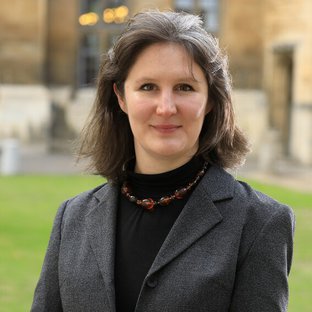
Dr Teresa Witcombe
Biography
My training as a historian began here at St John's College, where I did my BA Hons. This was followed by a Masters at the Sorbonne Paris-IV and the École des Hautes Études en Sciences Sociales, and several years working for the UN. I received my PhD in History from the University of Exeter in 2019, and subsequently was awarded a Leverhulme Trust research fellowship to pursue postdoctoral research in Madrid, where I was affiliated with the CSIC-CCHS and the Universidad Autónoma de Madrid. I have also been an Associate Fellow at the Institute of Historical Research for the past year, before returning to Oxford in 2022 to take up a British Academy postdoctoral research fellowship.
Research Interests
I am a scholar of the religious, cultural, and intellectual history of the Iberian Peninsula in the twelfth and thirteenth centuries. My doctoral research, forthcoming as a monograph, explored the life and thought of the enigmatic Bishop Maurice of Burgos, an early thirteenth-century prelate, scholar, and patron whose extraordinary career unfolded on the borderlines between the Islamic world and the Latin West.
The ways in which medieval Iberian Christians understood and interacted with Islam has been the central theme of my subsequent postdoctoral research. During a Leverhulme Trust research fellowship in Madrid, I investigated the ‘images of Islam’ constructed in texts from Castile, including the liturgy – notably, prayers ‘against the Saracens’ to be said on the eve of battle. I am also particularly interested in the efforts of medieval scholars and translators to render Arabic texts into Latin. My recent publications include two papers on the Latin translation of the Qur’an, and the increasingly literal and detailed way in which Christians approached the holy texts of Islam in thirteenth-century Iberia.
My new research project, funded by the British Academy, focuses on the movement of people – specifically, slaves and captives of war – between Muslim and Christian societies in Iberia over the course of the twelfth and thirteenth centuries. Drawing on sources from across the Peninsula, I explore the ways in which interreligious slavery was defined, regulated, and understood, and the effects that enslavement had on those captured and on their societies – both those they left and those they were constrained to join. In so doing, I aim to provide an integrated and interconnected analysis of interreligious slavery and its place as a topic of ever-growing importance for our understanding of the medieval world.
Teaching
I greatly enjoy teaching, in all its forms. I have taught undergraduate modules on medieval European and British history at the University of Bristol, and on Islamic history and culture from the seventh century to the present day at the Institute of Arabic and Islamic Studies at the University of Exeter. I have also delivered lectures and seminars to undergraduates and postgraduates at several universities in the UK and Spain, covering various aspects of medieval cultural and intellectual history, such as interfaith relations in the Middle Ages, learning and translation in medieval Europe, and the liturgy behind medieval warfare.
Awards and Distinctions
My research has been recognised through awards and fellowships from the British Academy, the Leverhulme Trust, the Arts and Humanities Research Council, the Institute of Historical Research (as a Scouloudi Junior Research Fellow), the Entente Cordiale Scholarship Programme, and the Centre de Recherches Historiques in France.
Recent Publications
‘Praying for conquest in thirteenth-century Castile: The Oratio in tempore belli adversus Saracenos’, in A Plural Peninsula: Studies in Honour of Professor Simon Barton, ed. A. Liuzzo Scorpo (Leiden: Brill, forthcoming).
‘The Qur’an and the ‘Laws of Muhammad’ in medieval Christian eyes’, in The Iberian Qur’an: From the Middle Ages to Modern Times, ed. M. García-Arenal and G. Wiegers (Berlin: De Gruyter, 2022), pp. 49-67. [https://doi.org/10.1515/9783110778847]
‘Mark of Toledo’s Liber Alchorani (‘The Book of the Qur’an’) and its reception in medieval Toledo’, in Mark of Toledo. Intellectual Context and Debates between Christians and Muslims in Early Thirteenth-Century Iberia, ed. Charles Burnett and Pedro Mantas España (Córdoba: University of Córdoba Press, 2022), pp. 21-39.
The Sword and the Cross: Castile-León in the Era of Fernando III (Leiden: Brill, 2020) [edited with Edward L. Holt]. [https://doi.org/10.1163/9789004428287]
‘Fernando III and his World’ [with E. Holt], in The Sword and the Cross: Castile-León in the reign of Fernando III, eds. Edward L. Holt and Teresa Witcombe (Leiden: Brill, 2020), 1-14. [https://doi.org/10.1163/9789004428287]
‘Maurice and the Mozarabic Charter: a cross-cultural transaction in early thirteenth-century Toledo’, Journal of Medieval Iberian Studies 10:2 (2018), 234-256. [https://doi.org/10.1080/17546559.2017.1409904]
‘Building heaven on earth: Bishop Maurice and the novam fabricam of Burgos cathedral’, Bulletin for Spanish and Portuguese Historical Studies 42.1 (2017), 46-60. [https://asphs.net/article/building-heaven-on-earth-bishop-maurice-and-the-novam-fabricam-of-burgos-cathedral/]